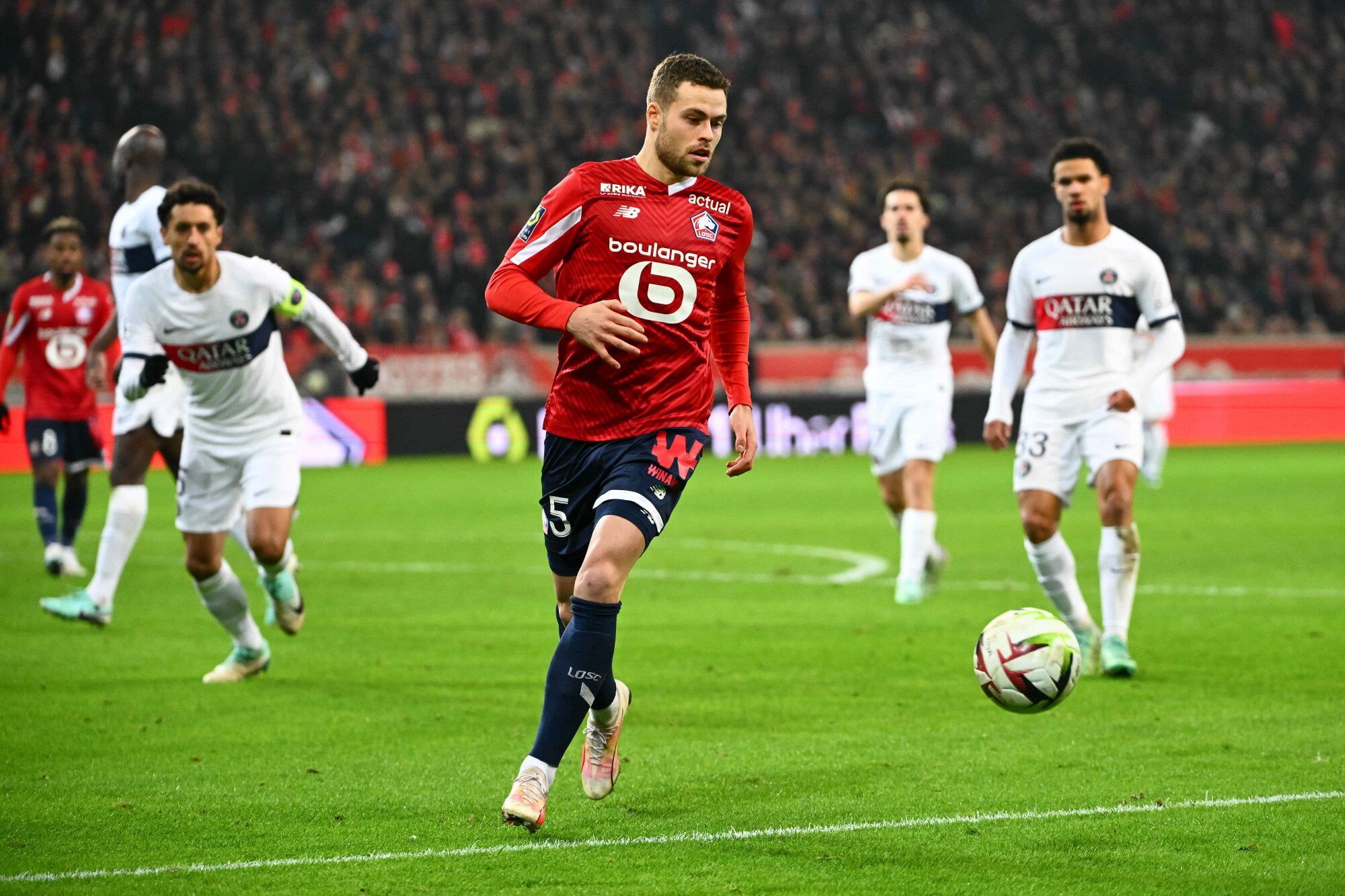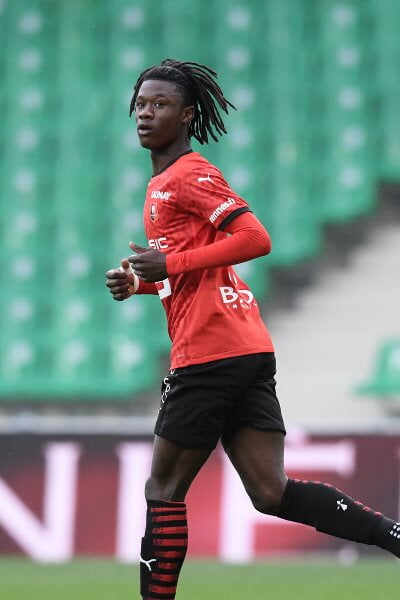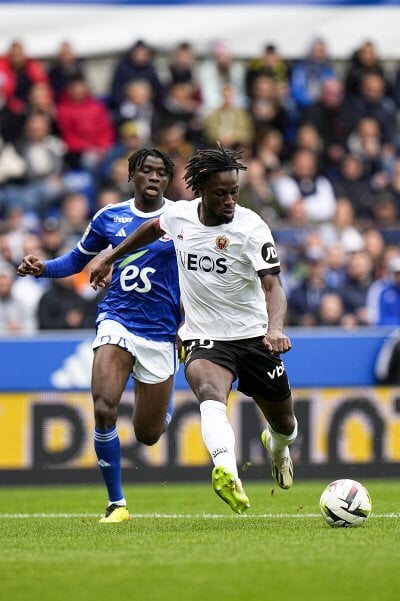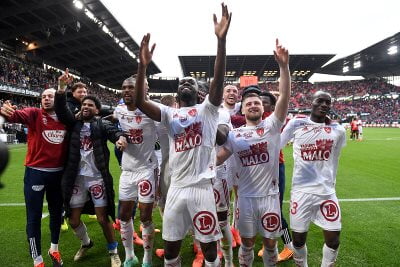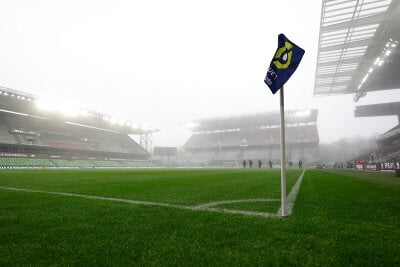In an exclusive interview, we sat down with LOSC Lille’s Swedish international Gabriel Gudmundsson to talk tactics, versatility, the level of Ligue 1 and more.
You played for the same club as your father, Halmstads BK. Can you talk about that experience — did you feel pressure as a young player?
Well, it’s a similar thing as I was born in another city where my father played as well. I grew up in Halmstads, and played there, joining the club when I was twelve years old. It was the start of my journey at a young age, up to the professional ranks. But in terms of pressure, not so much. Halmstads is a small club, a small city. They have done some good things in the past, but for me there was not pressure because it’s a very family-oriented atmosphere. I knew all the players, because we all went to the same school, and we had a good age group. Of course, in the beginning, when I reached the first team, journalists asked me about my father and this sort of thing, how it was when I joined the first team, what sort of pressure was there. But for me, I never thought about it like this, because for me, in my own way, I wanted to create something for myself and not just follow in the footsteps of my father, because he had a great career there. I wanted to have my own journey, and it was a good first step. I learned a lot, even if we went up down the leagues. I learned a lot, and after that I got the chance to go to Holland, but it was there that the journey really started.
Before joining Lille, you played in the Dutch league. Several other players, including Thijs Dallinga have recently talked about making this switch — how was your adaptation to French football, and do you feel accustomed to the style now?
It was tougher than I maybe expected, Ligue 1 Uber Eats is for me a very physical league. It doesn’t matter if you are playing Paris Saint-Germain or you’re playing Lorient. I think it’s got very physical players, strong players; this was my first reaction, and what first struck me. I can understand how that creates a problem — you have to be ready because it’s like every time you have the ball, an opponent is there and they’re fighting for the ball. So, it does take time to adapt, but when I came, I had a good group, good players around me, and we were playing in the Champions League in the first year. So, there were a lot of games, which in my case, it was good because I needed to get a sense of rhythm. And of course, I arrived as a left back, but also able to play as a left winger. It was also a little bit challenging to go back and forth between playing as a left winger and playing as a left back, but I think I’ve learned a lot since then. For me, I’m definitely not regretting coming here because I think I’ve developed very well, as a player and also outside of football. It’s a perfect step to take in my career.
Paulo Fonseca is a coach with a particular way of playing — he likes to keep possession and control the game, but the team this year has been much more solid defensively. Tell us about that change and how you feel it has affected your play?
For me personally I had a very difficult first six months (under Paulo Fonseca), the first half of last season, because I had a groin issue and even had to have surgery. So for me, these first six months, it was impossible for me to the right things, to show the real me. After that, I think I came into the group very well, I played a lot of games. The difference between this season and last season is that Paulo came in and at first the team didn’t really understand the way he wanted to play. Now, though, I think you can see that opponents treat us with a lot of respect. That’s why you’ll see a lot of teams sit deep, sit back, and keep things tight against us, playing with five at the back. You can also say, from my perspective, that it was a more open style of play. So we also changed something ourselves as well, to make the style of play better for us, to find the right positions, to find a more open way of playing the game. We have not changed too much, but there’s some details we need to change in the face of other teams having so much respect for us.
"My game has developed a lot, particularly since Paulo Fonseca came to the team"
You have earned your first caps for Sweden since coming to Lille. Can you tell us about the experience of playing for your country and how Ligue 1 has contributed to you coming into the reckoning?
First of all, it’s always an honor. I was excited like this, waiting for the opportunity to come when I arrived in Lille. It came in the spring of 2022, and I was very honored, of course, as every player would say. It’s the best thing you can do, to play for your national team, so I’m very happy about it, and to be playing in more matches lately. Now, I’m looking forward to the next ones, to getting selected again. And, as I said before, my game has developed a lot, particularly since Paulo Fonseca came to the team. Everything I am doing here has led to where I am with the national team. With the national team, you play because you are one of the best players in the country, so that means I have done something good with Lille as well, to reach that level. It’s a honor to have this happen, but I want more as well.
You have played as both as a left back and a left-sided winger. Competition in those places is very strong, from players like Ismaily and Ivan Cavaleiro. Can you talk about how your versatility has helped you in winning a place in the team?
This versatility started when I was a kid; I was a striker, a left winger, a right winger, up until the time I left Halmstads, at the age of 20. When I arrived at Groningen in Holland, I was still a striker. Then, COVID-19 came, and there was a break, and we stopped playing. When we came back, we changed the system, from four to five at the back, and I was playing wingback, or even dropping to left back at times. I was doing really well in both positions, and it served as a trigger in my career, to take this opportunity to come to Lille. So, yes, I’m very happy that I took the chance to play as a left back, or as a left winger — where I am today is a big difference from where I was before and I think that I feel comfortable now, playing more games in this position, and to see the patterns in games and training, to recognize the differences. Because I haven’t played for so long as a left back, you just need more and more time to see different situations, to learn from this. In fact, I think my first year here was more about learning than playing. You can see now that I’ve played in different positions because it’s the kind of tactics that the coach wants and I think he knows that he can trust me as a left winger as a different style from the way that, say, Cavaleiro is playing. The same is true for left back — he knows what I can do there as well, but it’s also a challenge to play there with Ismaily because he’s also a very good player that has made me a better player, because you need to be ready every training session, every match, every week, to do better than him. I hope it’s a good thing, that Paulo recognises it’s a good thing to have a player like me, who can play in different positions, and in different tactical systems. At the end of the day, for myself, I am a left back, and I want to play left back.
Lille had reached the Champions League before you signed, and have continued to be one of the league’s top teams, despite several departures and a managerial change. What do you see as the keys to this continued success?
I think this is down to Lille being a club that takes players develops them, and sells them on. Everyone knows this about Lille, I knew about this when I was with Groningen in Holland, and part of why I wanted to come here was that. It’s a very good club, with the aim of developing young players, allowing them to take a bigger step if it’s possible. Players know this, and there are players from big teams that have played for Lille in the past, people like Hazard, Osimhen, Gabriel at Arsenal. So I think players know this, and want to come here and develop.
"Players know it as a top five league"
What was your awareness of Ligue 1 before coming to Lille? When you were younger, did you look at Swedish players in France, like the Farneruds, Kim Källström, Andreas Isaksson, or others, and it mark it as a destination?
To be honest, not really, because Ligue 1 is not very famous in Sweden. It got more famous when Zlatan Ibrahimovic came to PSG — it was more talked about in articles, and on sports news in Sweden, but before and after his time here, Ligue 1 is not as well known there, at least compared to the Premier League, for example. The Premier League is something that everybody in Sweden watches, but while Ligue 1 might not be something that everyone watches at home with their families, it’s something that we know as players to be a top five league, with PSG and the star players that it has.
Who do you consider role models in your position and for the way you play?
This is a difficult question — I’m a person that likes to watch every team, every player. I have few specific players. I have one, but it doesn’t make a lot of sense for my position, because it’s Lionel Messi. This is because when I was a kid, I was a striker, up until the age of 20, 21, so he was really my idol, and I had the opportunity to play against him. But at the moment, when I’m watching matches on television, there are a lot of good teams, and it’s good to recognize our style in the top teams, because they play the way we do, with possession, and dominating play. But I’m also a player who is used to more open play, because I’m a player who is very explosive, and likes to exploit open spaces. So it’s hard to say one player, but for this reason, I loved players like Kyle Walker, Gareth Bale at Tottenham, Alphonso Davies — explosive wide players with pace. I also look at player like Trent Alexander-Arnold, how he uses space and the quality he has with the ball at his feet because that’s something I want to develop as well. Many things impress me as a footballer, but in the end it’s hard to choose one.
Tell us about a perfect day off in Lille — what are your favorite things to do around the city, and what is your life like off the pitch?
I’m someone who loves sports, so I love to watch sports. It doesn’t matter if it’s NHL, NFL, golf, Formula 1, I like to watch every sport. So most of the time, I’m watching sports, but I like to play golf, when I have the opportunity. In the season I don’t have the opportunity as much because we’re training every day. I have a girlfriend, so I like to spend time with her. When I have days off, we like to get outside and experience nature, to go on hikes and explore the area. In the summer, when there’s more time for it, I love to spend time with family and friends. Golf when I have the opportunity, and tennis as well — like I said, I am someone who loves sports, to watch them and to play.
Can you tell us about some things you like to do in Lille, in the city?
I live outside of the city, and Lille is good as a place to connect to other places — you can go to London, to Brussels, to Paris. I like to explore places like these with my girlfriend when we have days off. Whether it’s in Lille or not, though, I am a food lover — I like all kinds of food, so something we love to do is to go to different restaurants.
Last question — are you familiar with Kennet Anderson? He played with your father in the national team and also for Lille — he was a big player for Sweden in the World Cup in 1994. Was he someone who was involved in your choice of Lille?
I know who he is, of course, but he wasn’t a factor in coming to Lille. I had the opportunity to talk to Kim Källstrom before I came here, someone who played for Lyon, but I was quite sure I wanted to come here.

